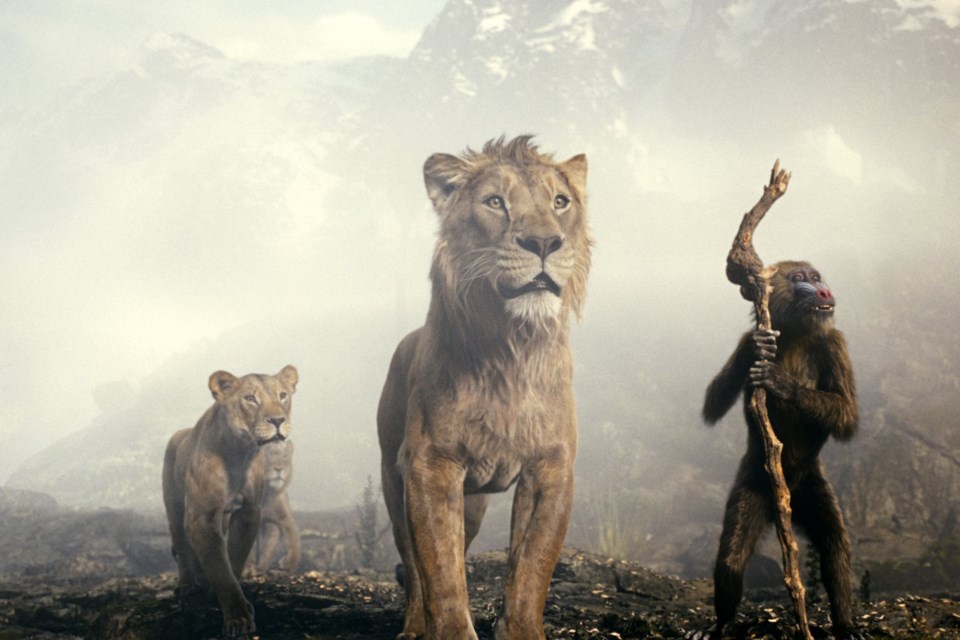has one very important thing going for it: an original story.
That may seem like faint praise or at least a very, very low bar in the grand scheme of things. But in a landscape where Disney continues to remake its animated catalogue in slightly different, and usually less interesting, forms whether “live action” or “photorealistic” that usually only serves to remind how good the 2D animation was, originality is not to be undervalued.
And this story isn’t simply checking off fan service boxes and overexplaining origins that never needed them: It’s actually good. A prequel to opening in theaters Thursday, it’s a tale of found family, betrayal and destiny, one that begins to explain the estrangement between brothers Scar and Mufasa that we all know will end in murder, how Mufasa ( ) ends up as king of the pride lands and, perhaps most importantly, why only one has an English accent.
In this telling, Scar was once Taka (Kelvin Harrison Jr.), destined to be king of his pride, and Mufasa was a lost cub, separated from his parents in a dramatic flood. Taka saves Mufasa and brings him into his family. His mother (Thandiwe Newton) embraces the newcomer; his father (Lennie James) rejects him as nothing but a stray. Not that it matters much to the cubs; both are thrilled to have a brother. They play and protect one another and grow up together. But fissures start to appear in this foundation as Mufasa emerges as the exceptional one and Taka as the coward. And then a lioness enters the picture in Sarabi (Tiffany Boone). We’ve all seen enough movies to know what happens with that.
The screenplay comes from veteran screenwriter Jeff Nathanson, whose credits include the 2019 “Lion King,” this year’s lovely and “Catch Me If You Can.” He clearly took a corporate mandate (give us more “Lion King”) and made the absolute least cynical version of that. There are still questionable corporate-feeling choices, like straining to tie it to a current and future “Lion King” by having Rafiki (John Kani) tell the story to Simba (Donald Glover) and Nala’s ( ) daughter Kiara ( ), Pumbaa (Seth Rogen) and Timon (Billy Eichner). These comedic breaks, and songs peppered throughout, aren’t additive. They really only serve to break up the momentum of the compelling main story.
But the biggest issue remains the form itself. The photo-realistic computer-generated animals may have technically improved since the 2019 “Lion King,” but they still aren’t movie stars like their 2D animation counterparts. Impressive though it may be intellectually, the reality of watching these animals for two hours is a somewhat numbing and dull experience despite the best efforts of director Barry Jenkins. The Oscar-winning filmmaker of did an admirable job adding visual interest and color into the landscapes, bringing it closer to the vibrancy of animation than ever before, and making it as cinematic as possible. The original story also helps here in that he was never going to have to recreate iconic sequences in a less stimulating form. There are just inherent limitations that filmmakers have not yet figured out, including how odd it looks for these animals’ mouths to be moving and speaking English words. It’s strangest when they’re singing, mouths agape to hold the long notes in a way that no lion’s mouth should ever appear.
If this is one future for filmmaking there’s still a lot of room for improvement and experimentation. That doesn’t mean it shouldn’t be embraced while the kinks are worked out. But it also doesn’t mean the moviegoing public has to get excited about every rehash. “Mufasa: The Lion King” is better than the ones that came before it, but that doesn’t mean it’s great.
“Mufasa: The Lion King,” a Walt Disney Studios release in theaters Thursday, is rated PG by the Motion Picture Association for “peril, action/violence and some thematic elements.” Running time: 118 minutes. Two and a half stars out of four.
Lindsey Bahr, The Associated Press


